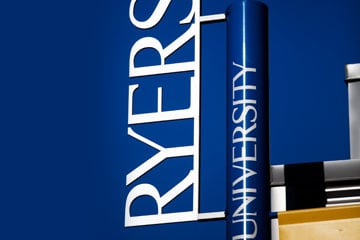Ryerson University is aiming to have a new law school up and running by September 2019 if it receives approval from the Federation of Law Societies of Canada and the Ontario government.

Ryerson University is aiming to have a new law school up and running by September 2019 if it receives approval from the Federation of Law Societies of Canada and the Ontario government. In June, the Ryerson University senate unanimously approved the proposal for the law school, bringing Ryerson one step closer to being Canada’s newest law school.
In a report sent to the Ryerson senate this summer, which outlines the philosophy and plan of the proposed law school, Ryerson pitches a law school more oriented to “practice readiness and change management” than what it argues currently exists in the legal academy. “Ryerson acknowledges and respects the important work of the law schools that now educate law students,” the report states. “However, Ryerson proposes a different kind of law school that trains lawyers differently.”
While the law school proposal includes the standard courses required by the Federation of Law Societies, it also includes courses and training in data management, emotional intelligence, entrepreneurial spirit, financial literacy, network building, process improvement, strategic thinking and technological proficiency. Ryerson also stresses that the university’s “innovative and entrepreneurial” environment, including the Legal Innovation Zone legal incubator and the Law Practice Program, will help foster a different kind of law school.
The proposal’s stress on innovation and practice readiness has raised hackles among existing law schools. A letter published by the Canadian Council of Law Deans in November 2016 countered that “any decision to approve and fund such a program must be based on an accurate picture of the dynamism and innovation at existing law schools, as well as their long-standing commitment to academic and educational excellence, not the caricature of Canadian legal education that Ryerson has advanced.”
Gina Alexandris, the director of the Law Practice Program at Ryerson and a member of the law school originating committee, outlined in an email that Ryerson has had conversations with individual law deans about the proposal. She also said Ryerson has extended an invitation to the CCLD to discuss the proposal with the entire group but has had no response to this invitation.
Alexandris wrote that neither the FLSC nor the Ontario government has provided specific timelines on potential approvals but that Ryerson is “in an iterative process with both these bodies, obtaining questions and providing additional information and clarification, as needed, to the proposal.”
The report sent to the Ryerson senate also cites an external review by Professor Brent Cotter, who concluded that “Ryerson is proposing the establishment of a law school that builds upon the solid academic traditions of existing law school programs, but contemplates a different, supplementary objective — a focus on the future of law practice, and a model of educating law students that will prepare them for that future, all within the context of Ryerson’s own vision."










